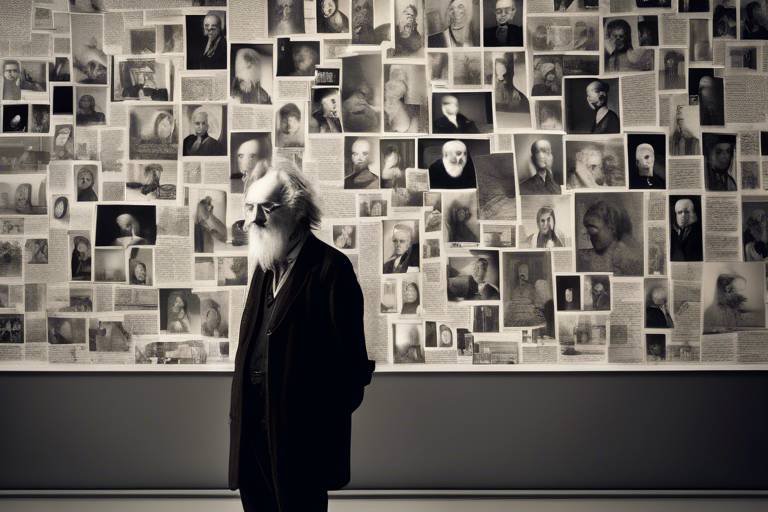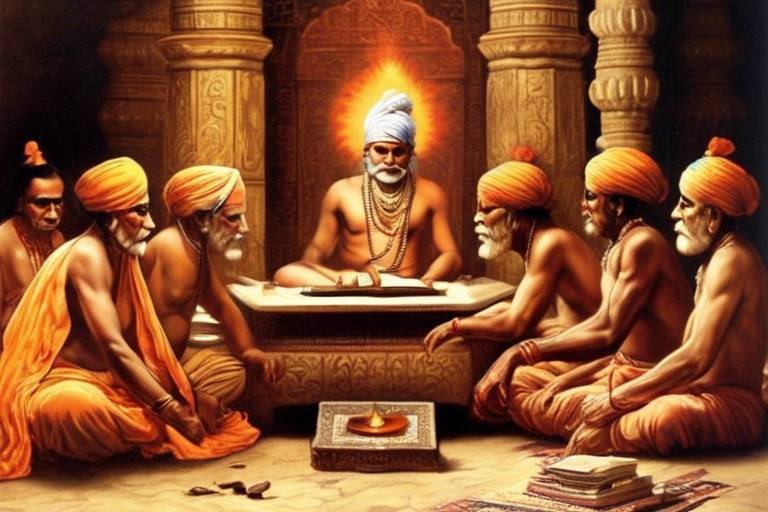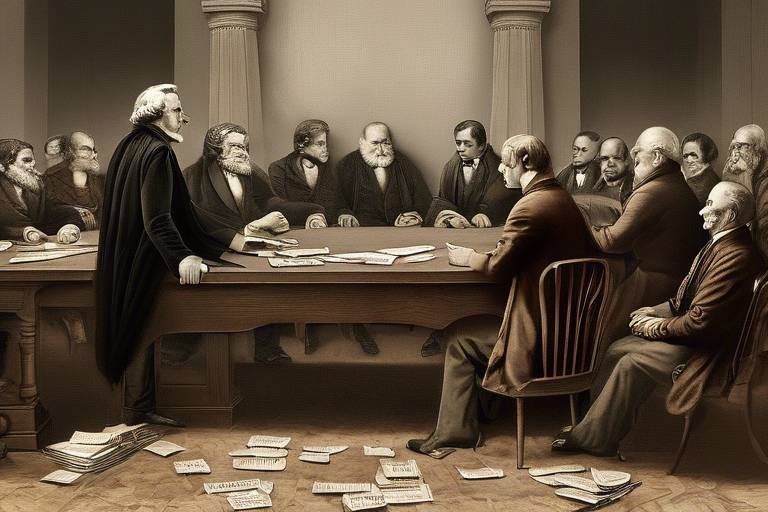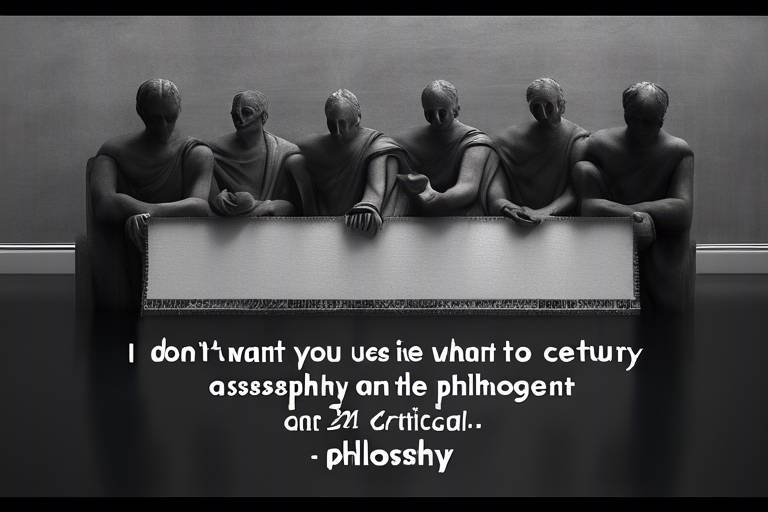Tracing the Origins of Post-Modern Philosophy
The journey into the realm of post-modern philosophy is akin to stepping into a vibrant, chaotic bazaar where ideas collide, intermingle, and often contradict one another. Unlike its predecessor, modernism, which sought to establish absolute truths and grand narratives, post-modernism embraces a world of multiplicity and fragmentation. It invites us to question everything we thought we knew, challenging the very foundations of knowledge and belief systems. But where did this captivating shift in thought originate?
To fully appreciate the emergence of post-modern philosophy, we must first take a step back into the historical context of the late 20th century. This was a time marked by significant socio-political upheaval, technological advancements, and cultural transformations. The aftermath of World War II, the rise of the civil rights movement, and the explosion of media and communication technologies all contributed to a climate ripe for philosophical innovation. In this environment, thinkers began to recognize the limitations of modernist ideals, leading to a philosophical revolution that would redefine the landscape of thought.
Post-modern philosophy is not merely a reaction against modernism; it is a complex tapestry woven from the threads of various intellectual movements. It draws from existentialism, structuralism, and even feminism, creating a rich dialogue that transcends traditional boundaries. This philosophical shift encourages us to embrace uncertainty and to celebrate the diversity of perspectives that exist in our world. Just as a kaleidoscope reveals a myriad of colors and shapes with every turn, post-modernism reveals the beauty in complexity and contradiction.
As we delve deeper into the origins of post-modern philosophy, we will encounter key figures who have shaped its trajectory. Thinkers such as Jean-François Lyotard, Jacques Derrida, and Michel Foucault stand at the forefront of this movement, each contributing unique insights that challenge established narratives. Their ideas resonate not only within philosophy but also across disciplines, influencing art, literature, and the social sciences. The interplay between these thinkers and their context creates a rich soil from which post-modern thought has flourished.
In understanding the origins of post-modern philosophy, it is essential to recognize that it is not a monolithic entity. Instead, it is a dynamic and evolving conversation that continues to unfold. As we explore the key philosophers and core concepts that define this movement, we will uncover the profound impact that post-modernism has had on contemporary thought. Are we ready to embrace this chaotic yet exhilarating journey into a world where certainty is an illusion, and every perspective holds value?
- What is post-modern philosophy? Post-modern philosophy is a movement that emerged in the late 20th century, characterized by skepticism toward grand narratives and an emphasis on the relativity of truth.
- Who are the key figures in post-modern philosophy? Influential philosophers include Jean-François Lyotard, Jacques Derrida, and Michel Foucault, each contributing significantly to the development of post-modern thought.
- How does post-modernism differ from modernism? While modernism seeks absolute truths and universal narratives, post-modernism embraces diversity, fragmentation, and the idea that meaning is context-dependent.
- What impact has post-modern philosophy had on contemporary thought? Post-modern philosophy has influenced various fields, including literature, art, and social sciences, encouraging critical engagement with established norms and conventions.

The Historical Context
Understanding the socio-political and cultural backdrop of the late 20th century is essential for grasping the emergence of post-modern philosophy and its departure from modernist ideals. The world was in a state of flux, grappling with the aftermath of major events such as World War II, the Vietnam War, and the rise of globalization. These events fostered a sense of disillusionment with grand narratives that had previously dominated thought, such as progress, reason, and absolute truth. Instead of viewing history as a linear progression towards enlightenment, thinkers began to see it as a series of fragmented moments, each shaped by its unique context.
During this time, cultural shifts began to take root, as traditional values were questioned and the authority of institutions came under scrutiny. The rise of the civil rights movement, feminist movements, and anti-colonial struggles challenged the established order and brought forth new voices that demanded recognition. These movements highlighted the importance of diversity and the need for multiple perspectives, laying the groundwork for post-modern thought.
Moreover, the advent of technology and the proliferation of mass media transformed the way people consumed information. With the rise of the internet, access to diverse opinions and narratives became more widespread, further eroding the dominance of any single viewpoint. In this context, the idea that knowledge could be objective and universal began to crumble, giving way to a more relativistic approach that emphasized the significance of context in shaping understanding.
In essence, the historical context of post-modern philosophy can be summarized through several key elements:
- Disillusionment with grand narratives: The failures of modernist ideals led to skepticism about overarching explanations.
- Rise of social movements: Voices from marginalized groups challenged established norms and called for recognition of diverse perspectives.
- Technological advancements: The internet and mass media facilitated the spread of varied narratives, further questioning the notion of objective truth.
This backdrop not only shaped the thinkers of the post-modern era but also influenced the way philosophy was approached. No longer was philosophy seen as a quest for absolute answers; rather, it became an exploration of the complexities and contradictions inherent in human experience. As we delve deeper into the contributions of key philosophers who emerged during this time, we'll see how they reflected and responded to this rich tapestry of historical context.

Key Philosophers
When we dive into the realm of post-modern philosophy, we encounter a vibrant tapestry woven by the thoughts and ideas of several influential thinkers. These philosophers didn't just contribute to a new way of thinking; they challenged the very foundations of established narratives and norms. Among them, Jean-François Lyotard, Jacques Derrida, and Michel Foucault stand out as pivotal figures who reshaped the philosophical landscape.
Lyotard, for instance, is best known for his concept of incredulity toward metanarratives. This idea critiques the grand narratives—those sweeping theories and ideologies that claim to explain everything, from history to human behavior. Instead, Lyotard champions the significance of localized, diverse perspectives, suggesting that knowledge and truth are not universal but rather shaped by context and experience. This shift is akin to moving from a grand symphony to a collection of unique, individual melodies, each with its own story to tell.
Moving on to Jacques Derrida, we find a philosopher who introduced the world to deconstruction. This methodology serves as a powerful tool for unpacking texts and concepts, revealing the inherent contradictions and complexities that lie beneath the surface. Derrida's work challenges the notion of fixed meanings, suggesting that language is fluid and ever-changing. His approach encourages us to question not just what is said, but how it is said, much like peeling back the layers of an onion to uncover the rich, nuanced truths hidden within.
Michel Foucault, another titan of post-modern thought, takes us on a journey through the interplay of power, knowledge, and discourse. Foucault's analyses reveal how societal structures and institutions shape our understanding of truth and reality. He famously stated that "knowledge is power," highlighting the ways in which knowledge production is intertwined with power dynamics. This perspective invites us to reflect on how our beliefs and values are influenced by the systems in which we live, much like a fish unaware of the water it swims in.
These three philosophers—Lyotard, Derrida, and Foucault—each bring a unique lens through which to view the complexities of human thought and experience. Their ideas not only challenge traditional philosophical inquiries but also resonate across various fields, including literature, art, and social sciences. As we explore their contributions, we begin to see the profound impact they have had on contemporary thought, inviting us to embrace a more fragmented, pluralistic understanding of the world.

Jean-François Lyotard
Jean-François Lyotard stands as a towering figure in the realm of post-modern philosophy, primarily known for his provocative assertion of incredulity toward metanarratives. This concept fundamentally challenges the grand narratives—those sweeping theories and ideologies that claim to explain the entirety of human experience, such as religion, science, and history. Instead, Lyotard argues for the importance of localized, diverse perspectives, suggesting that truth is not a monolithic entity but rather a mosaic of individual narratives. Imagine a grand tapestry where each thread represents a unique story; when woven together, they create a rich and complex picture of reality, but no single thread can claim to represent the whole.
Lyotard’s philosophy invites us to reconsider how we approach knowledge and truth. In a world where information is abundant and often contradictory, he encourages us to embrace a pluralistic view. This shift is not just theoretical; it has profound implications across various fields, including education, politics, and art. For instance, in education, Lyotard's ideas suggest that teaching should not merely convey established truths but rather encourage students to engage with multiple perspectives and develop their understanding of complex issues.
Lyotard's impact extends beyond philosophy into the world of art, where his ideas catalyzed a transformation in artistic expression. The post-modern art movement embraced fragmentation and pluralism, moving away from the cohesive narratives of modernism. Artists began to experiment with diverse forms and media, reflecting the complexities of contemporary life. This shift can be seen in various movements, such as conceptual art, where the idea behind the artwork often takes precedence over traditional aesthetics. The result is a vibrant landscape of creativity that mirrors the multiplicity of human experience.
Another critical aspect of Lyotard's philosophy is his exploration of language. He posits that language is not merely a tool for communication but a fundamental medium through which we construct our understanding of reality. This perspective leads to his concept of language games, where meanings are not fixed but are shaped by context and usage. For instance, consider how the word "freedom" can evoke vastly different interpretations depending on cultural, political, or personal contexts. By recognizing this fluidity, Lyotard encourages us to be aware of how our language shapes our perceptions and interactions with the world.
In summary, Jean-François Lyotard's contributions to post-modern philosophy challenge us to rethink our assumptions about knowledge, truth, and artistic expression. His emphasis on the importance of diverse narratives and the role of language invites a more nuanced understanding of our complex world. By embracing these ideas, we can cultivate a richer, more inclusive dialogue that honors the multitude of human experiences.
- What is the main idea behind Lyotard's "incredulity toward metanarratives"?
Lyotard's main idea is that we should be skeptical of overarching narratives that claim to explain all aspects of human experience, advocating instead for a recognition of diverse, localized perspectives. - How did Lyotard influence modern art?
His ideas encouraged artists to move away from cohesive narratives and embrace fragmentation and pluralism, leading to innovative forms of expression in post-modern art. - What are language games according to Lyotard?
Language games refer to the idea that meanings are not fixed but are shaped by context and usage, highlighting the fluidity of language in constructing our understanding of reality.

incredulity toward metanarratives
This article explores the historical roots and key figures that shaped post-modern philosophy, examining its evolution, core concepts, and impact on contemporary thought.
Understanding the socio-political and cultural backdrop of the late 20th century is essential for grasping the emergence of post-modern philosophy and its departure from modernist ideals.
This section highlights influential thinkers such as Jean-François Lyotard, Jacques Derrida, and Michel Foucault, who contributed significantly to the development of post-modern thought and its critique of established narratives.
Lyotard's concept of the challenges grand narratives, emphasizing the importance of localized, diverse perspectives in understanding knowledge and truth.
Exploring how Lyotard's ideas permeated artistic movements, this subsection discusses the shift towards fragmented, pluralistic forms of expression in post-modern art.
An examination of Lyotard's theories on language reveals how communication shapes our understanding of reality, emphasizing the role of language games in post-modern philosophy.
Derrida's deconstruction methodology offers tools for analyzing texts and concepts, revealing inherent contradictions and challenging the idea of fixed meanings in language and philosophy.
This section delves into fundamental themes of post-modern philosophy, such as relativism, irony, and the rejection of absolute truths, illustrating how these concepts redefine traditional philosophical inquiries.
Exploring the implications of relativism, this subsection discusses how post-modern philosophy questions the objectivity of knowledge and emphasizes the significance of context in shaping understanding.
Irony serves as a crucial tool in post-modern philosophy, allowing for a playful engagement with ideas and fostering a critical stance towards established norms and conventions.
Analyzing the influence of post-modern philosophy on various fields, including literature, art, and social sciences, this section highlights its enduring legacy and ongoing relevance in today's intellectual landscape.
Jean-François Lyotard's notion of serves as a cornerstone of post-modern philosophy. But what does this really mean? In simple terms, it reflects a deep skepticism towards the grand narratives or overarching stories that societies often tell themselves to make sense of the world. Think of it like this: if modernism sought to build a universal framework for truth, post-modernism throws a wrench into that machine, suggesting that these grand narratives are not only flawed but also potentially oppressive.
In a world that often feels chaotic and fragmented, Lyotard argues that we should embrace the multiplicity of voices and experiences rather than clinging to a singular, all-encompassing narrative. This shift is not merely philosophical; it has profound implications for how we understand culture, politics, and knowledge. By rejecting the idea that any one story can claim absolute truth, we open ourselves up to a more diverse and inclusive understanding of reality.
To illustrate this point, consider the following table:
| Metanarratives | Post-Modern Perspective |
|---|---|
| Universal Truths | Contextual Truths |
| Single Narrative | Multiple Narratives |
| Absolute Knowledge | Relational Knowledge |
Lyotard's incredulity encourages us to question the validity of these metanarratives. Are they really serving us, or are they simply tools of power that silence alternative perspectives? In this light, the post-modern approach invites us to celebrate diversity and complexity, allowing for a richer tapestry of human experience. It’s like being at a grand buffet where every dish tells a different story, rather than being served a single, bland meal that everyone is expected to enjoy.
- What are metanarratives? Metanarratives are overarching stories or theories that attempt to explain large-scale historical and cultural phenomena.
- Why is incredulity toward metanarratives important? It encourages a more nuanced understanding of truth, allowing for multiple perspectives and reducing the dominance of any single narrative.
- How does this concept affect modern society? It fosters a more inclusive dialogue, recognizing the validity of diverse experiences and viewpoints.

challenges grand narratives, emphasizing the importance of localized, diverse perspectives in understanding knowledge and truth.
This article explores the historical roots and key figures that shaped post-modern philosophy, examining its evolution, core concepts, and impact on contemporary thought.
Understanding the socio-political and cultural backdrop of the late 20th century is essential for grasping the emergence of post-modern philosophy and its departure from modernist ideals.
This section highlights influential thinkers such as Jean-François Lyotard, Jacques Derrida, and Michel Foucault, who contributed significantly to the development of post-modern thought and its critique of established narratives.
Lyotard's concept of the incredulity toward metanarratives challenges grand narratives, emphasizing the importance of localized, diverse perspectives in understanding knowledge and truth.
Exploring how Lyotard's ideas permeated artistic movements, this subsection discusses the shift towards fragmented, pluralistic forms of expression in post-modern art.
An examination of Lyotard's theories on language reveals how communication shapes our understanding of reality, emphasizing the role of language games in post-modern philosophy.
Derrida's deconstruction methodology offers tools for analyzing texts and concepts, revealing inherent contradictions and challenging the idea of fixed meanings in language and philosophy.
This section delves into fundamental themes of post-modern philosophy, such as relativism, irony, and the rejection of absolute truths, illustrating how these concepts redefine traditional philosophical inquiries.
Exploring the implications of relativism, this subsection discusses how post-modern philosophy questions the objectivity of knowledge and emphasizes the significance of context in shaping understanding.
Irony serves as a crucial tool in post-modern philosophy, allowing for a playful engagement with ideas and fostering a critical stance towards established norms and conventions.
Analyzing the influence of post-modern philosophy on various fields, including literature, art, and social sciences, this section highlights its enduring legacy and ongoing relevance in today's intellectual landscape.
Jean-François Lyotard's assertion that we should be incredulous toward metanarratives is a cornerstone of post-modern philosophy. This idea fundamentally challenges the grand narratives—those sweeping explanations that claim to provide universal truths or a singular understanding of history and knowledge. Instead, Lyotard argues for the recognition of localized, diverse perspectives that reflect the complexities of human experience. In this view, knowledge is not a one-size-fits-all concept; rather, it is shaped by context, culture, and individual experiences.
Imagine a vast tapestry woven from countless threads, each representing a different story, culture, or viewpoint. To focus solely on one thread, the grand narrative, would mean ignoring the rich diversity of the entire tapestry. Lyotard's philosophy invites us to appreciate the intricate patterns that emerge when we consider multiple perspectives, suggesting that our understanding of truth is inherently pluralistic.
In practice, this means that knowledge is not fixed; it is fluid and constantly evolving. It encourages a more democratic approach to understanding, where various voices are heard and valued. This shift has profound implications not just in philosophy, but across fields such as literature, art, and social sciences. By embracing a multitude of perspectives, we foster a more inclusive and nuanced understanding of the world.
- What is post-modern philosophy?
Post-modern philosophy is a movement that emerged in the late 20th century, characterized by skepticism toward grand narratives and an emphasis on diverse perspectives. - Who are the key figures in post-modern philosophy?
Key figures include Jean-François Lyotard, Jacques Derrida, and Michel Foucault, each contributing unique insights to the field. - What does "incredulity toward metanarratives" mean?
This phrase, coined by Lyotard, refers to the skepticism towards overarching narratives that claim to explain all aspects of knowledge and truth. - How does post-modern philosophy impact contemporary thought?
Post-modern philosophy influences various fields by promoting relativism, irony, and a focus on localized knowledge, reshaping how we engage with ideas.

Lyotard's Influence on Art
Jean-François Lyotard's philosophical inquiries have had a profound impact on the art world, acting as a catalyst for a dramatic shift in how art is created and interpreted. His idea of the incredulity toward metanarratives resonates deeply within the fabric of post-modern art, encouraging artists to break away from the grand narratives that once dominated the artistic landscape. Instead, they embraced a more fragmented and pluralistic approach, reflecting the diverse realities and experiences of contemporary society.
This transformation can be seen in various art movements that emerged during and after Lyotard's time, such as postmodernism, conceptual art, and installation art. Artists began to question traditional forms and mediums, opting instead for a more eclectic and experimental style. The result? A rich tapestry of artistic expression that celebrates individual perspectives and challenges the notion of a singular truth.
One of the most striking aspects of Lyotard's influence is the way it has liberated artists from the constraints of conventional representation. In the past, art often sought to convey a specific message or narrative. However, post-modern artists, inspired by Lyotard's theories, have embraced ambiguity, irony, and even chaos as valid forms of expression. This shift has led to the emergence of various styles and genres, including:
- Mixed Media: Combining different materials and techniques to create works that defy categorization.
- Performance Art: Engaging the audience in real-time, blurring the lines between artist and viewer.
- Digital Art: Utilizing technology to produce art that reflects the complexities of the modern world.
Furthermore, Lyotard's emphasis on the role of language in shaping our understanding of reality has also left its mark on art. Artists have begun to explore the relationship between text and image, often incorporating language into their work to challenge viewers' perceptions. This interplay invites audiences to engage with art on a deeper level, prompting them to question not only what they see but also how they interpret it.
In essence, Lyotard's influence on art serves as a reminder that creativity is not bound by tradition. Instead, it thrives in an environment that values diversity, multiplicity, and the subjective experience. As we move forward, it is essential to recognize the lasting impact of his ideas, which continue to inspire artists to push boundaries and explore new horizons in the ever-evolving landscape of contemporary art.
Q: What is the main idea behind Lyotard's concept of incredulity toward metanarratives?
A: Lyotard's concept suggests that grand narratives or overarching explanations of history and culture are no longer credible. Instead, he advocates for the recognition of multiple, localized narratives that reflect diverse perspectives.
Q: How has post-modern art changed as a result of Lyotard's influence?
A: Post-modern art has shifted towards a more fragmented and pluralistic approach, embracing ambiguity and irony while challenging traditional forms and narratives.
Q: Can you give examples of art movements influenced by Lyotard?
A: Yes! Movements such as conceptual art, installation art, and mixed media have all been influenced by Lyotard's ideas, encouraging artists to experiment with new forms and materials.

Lyotard and Language
Language, in the framework of Jean-François Lyotard, is not merely a tool for communication; it is a complex game that shapes our perception of reality. His theories suggest that the way we use language significantly influences our understanding of the world around us. Imagine language as a prism: when light passes through it, the colors that emerge are not just reflections of the light itself but are also shaped by the form and texture of the prism. Similarly, our interpretations and meanings are colored by the linguistic structures we employ.
Lyotard introduces the idea of language games, a concept that emphasizes the contextual nature of meaning. He argues that words do not carry fixed meanings; instead, their significance is determined by the context in which they are used. This notion challenges the traditional view of language as a stable and reliable medium for conveying truth. Just as a game has rules that can change depending on the players and the environment, so too does language adapt and evolve based on its usage. This perspective invites us to consider several key points:
- Context Matters: The meaning of a word can shift dramatically depending on the situation, the speaker, and the audience.
- Multiplicity of Meanings: A single phrase can evoke a myriad of interpretations, highlighting the richness and complexity of language.
- Critique of Metanarratives: By focusing on localized language use, Lyotard critiques overarching narratives that claim absolute truths.
This approach to language has profound implications for how we engage with texts and ideas. In a world where information is abundant and often conflicting, Lyotard's insights encourage us to be critical consumers of language. We are prompted to ask questions like: What assumptions are embedded in the language we encounter? and How does the context shape our understanding of a particular message? By recognizing the fluidity of language, we can better navigate the complexities of communication in our daily lives.
Moreover, Lyotard's emphasis on language as a series of games promotes a playful engagement with ideas. Instead of viewing philosophical discourse as a rigid structure, he invites us to explore the nuances and contradictions inherent in language. This playful approach can lead to a deeper understanding of philosophical concepts, as it encourages us to embrace ambiguity and uncertainty. In this light, language becomes a dynamic entity, constantly in flux and open to interpretation.
In conclusion, Lyotard's exploration of language not only reshapes our understanding of communication but also challenges us to rethink the very foundations of knowledge. By recognizing the role of language games in shaping our realities, we can appreciate the complexities of meaning and the importance of context in our interactions. This perspective not only enriches our philosophical inquiries but also enhances our everyday conversations, making us more aware of the power of words.
- What are language games? Language games refer to the idea that meaning is created through the context and use of language, rather than being fixed or absolute.
- How does Lyotard's view on language differ from traditional views? Traditional views often see language as a stable medium for conveying truth, while Lyotard emphasizes its fluidity and the influence of context on meaning.
- Why is context important in understanding language? Context shapes the meaning of words and phrases, leading to different interpretations based on the situation, speaker, and audience.

Jacques Derrida
Jacques Derrida is often regarded as one of the most influential philosophers of the 20th century, particularly in the realm of post-modern thought. His approach, known as deconstruction, serves as a critical tool for analyzing texts and ideas, unraveling their complexities and contradictions. Imagine trying to untangle a ball of yarn; Derrida's methodology allows us to take apart the tightly wound assumptions and meanings that have been traditionally accepted in philosophy and literature.
At the heart of Derrida's deconstruction is the notion that meaning is never fixed. Instead, it is fluid, constantly shifting based on context and interpretation. This challenges the very foundations of how we understand language and communication. For Derrida, language is not merely a tool for conveying thoughts but a dynamic system where meanings can change. He famously stated, "There is nothing outside of the text," suggesting that our understanding of the world is mediated through language itself.
One of the key aspects of Derrida's thought is the idea of binary oppositions. These are pairs of contrasting concepts, such as good/evil, presence/absence, and speech/writing, that have historically been used to structure our understanding of reality. Derrida argued that these binaries are often hierarchical, privileging one term over the other. For example, in the speech/writing binary, speech is often seen as more authentic or immediate than writing. By deconstructing these oppositions, Derrida reveals the instability of meaning and encourages us to question the underlying assumptions that shape our beliefs.
To illustrate Derrida's impact, consider the following table that summarizes key concepts of his philosophy:
| Concept | Description |
|---|---|
| Deconstruction | A method of critical analysis that seeks to expose and undermine the assumptions behind texts and ideas. |
| Binary Oppositions | Pairs of contrasting terms that are often hierarchically structured, revealing the instability of meaning. |
| Différance | A term coined by Derrida to describe the process of meaning being deferred and never fully present. |
Derrida's influence extends beyond philosophy into various fields, including literature, law, and cultural studies. His ideas encourage a playful yet critical engagement with texts, prompting readers to question established norms and conventions. By embracing uncertainty and ambiguity, Derrida opens up new avenues for understanding and interpretation, making his work a cornerstone of post-modern philosophy.
In summary, Jacques Derrida's deconstruction challenges us to rethink our assumptions about language, meaning, and knowledge. His work invites us to embrace complexity and ambiguity, allowing for a richer understanding of the world around us. As we navigate the intricate web of ideas and texts, Derrida's insights remind us that meaning is never static; it is a vibrant and evolving dance of interpretation.

Core Concepts of Post-Modernism
Post-modern philosophy is a vibrant tapestry woven from various threads of thought, each contributing to a rich understanding of reality. At its core, post-modernism challenges the very foundations of traditional philosophy, introducing concepts that invite us to rethink our assumptions about knowledge, truth, and meaning. One of the most striking features of this philosophical movement is its embrace of relativism, which posits that our understanding of truth is not absolute but rather shaped by context, culture, and individual perspectives. This notion leads to a fascinating exploration of how different narratives coexist, often in tension with one another.
Imagine walking into a room filled with mirrors; each reflection offers a unique image of the same person. This metaphor captures the essence of relativism in post-modern thought, suggesting that no single perspective can claim superiority over another. Instead, multiple viewpoints coexist, each valid in its own right. This idea challenges the notion of an objective reality, prompting us to consider how our backgrounds, beliefs, and experiences influence our interpretations of the world.
Another crucial concept in post-modernism is irony. Irony serves as a playful yet profound tool that allows philosophers and artists alike to engage with established norms and conventions critically. It invites us to question the seriousness with which we approach grand narratives and absolute truths. By employing irony, post-modern thinkers encourage a more flexible and nuanced engagement with ideas, suggesting that meaning is not fixed but rather fluid and subject to change.
Furthermore, the rejection of absolute truths is a defining characteristic of post-modern philosophy. This rejection does not imply a descent into nihilism; rather, it opens up a space for dialogue and exploration. In a world where certainty is increasingly elusive, post-modernism invites us to embrace ambiguity and complexity. For instance, in literature, narratives often intertwine multiple voices and perspectives, reflecting the chaotic nature of contemporary life. This multiplicity of voices not only enriches the narrative but also underscores the idea that truth is often a mosaic rather than a singular entity.
To better understand these concepts, let’s break down some of the key elements of post-modern philosophy:
- Relativism: The belief that knowledge and truth are not universal but rather depend on individual and cultural contexts.
- Irony: A tool that encourages playful engagement with ideas, fostering a critical stance towards established norms.
- Rejection of Absolute Truths: The notion that truth is not fixed, allowing for a more dynamic exploration of meaning.
In essence, post-modernism invites us to step back and reconsider our approach to knowledge and truth. It challenges us to engage with the world in a way that acknowledges the plurality of experiences and perspectives. As we navigate through this complex landscape, it becomes clear that the core concepts of post-modernism not only redefine traditional philosophical inquiries but also resonate deeply within contemporary thought.
What is post-modern philosophy?
Post-modern philosophy is a movement that emerged in the late 20th century, characterized by skepticism towards grand narratives and absolute truths. It emphasizes the importance of context and individual perspectives in shaping knowledge and meaning.
Who are the key figures in post-modern philosophy?
Some influential thinkers include Jean-François Lyotard, Jacques Derrida, and Michel Foucault, each contributing unique ideas that challenge traditional philosophical frameworks.
How does post-modernism impact contemporary thought?
Post-modernism has profoundly influenced various fields, including literature, art, and social sciences, encouraging a more pluralistic and critical approach to understanding human experience.

Relativism in Post-Modern Thought
Relativism is a cornerstone of post-modern philosophy, fundamentally reshaping how we perceive knowledge and truth. Unlike the modernist belief in absolute truths and universal narratives, post-modern thought embraces the idea that knowledge is not static but rather fluid and context-dependent. This shift is akin to stepping into a kaleidoscope where every turn reveals a different perspective, highlighting the notion that our understanding of reality is influenced by various factors such as culture, history, and personal experiences.
One of the most significant implications of relativism in post-modern thought is the recognition that there is no single, objective standpoint from which to view the world. Instead, each individual's viewpoint is shaped by their unique context. This idea challenges the traditional philosophical inquiries that sought to establish universal truths, prompting a re-evaluation of how we approach knowledge. The implications of this are profound, as they suggest that what we consider "truth" is often a construct of societal norms and power dynamics, rather than an absolute fact.
To better understand relativism, consider the following key aspects:
- Context Matters: In post-modern thought, the context in which knowledge is produced and understood is paramount. What might be considered true in one cultural or historical setting may not hold the same weight in another.
- Multiplicity of Perspectives: Embracing relativism encourages a celebration of diverse viewpoints. This multiplicity enriches discussions and allows for a more comprehensive understanding of complex issues.
- Critique of Authority: Relativism often leads to a critical stance towards established authorities and narratives, questioning who gets to define what is "true" or "valid."
Furthermore, relativism in post-modern thought does not imply that all viewpoints are equally valid; rather, it emphasizes the importance of critical engagement with different perspectives. This critical approach allows individuals to navigate the complexities of contemporary life, where conflicting viewpoints often collide. By acknowledging that our understanding is shaped by various contexts, we can foster a more inclusive discourse that appreciates the richness of human experience.
In conclusion, relativism serves as a powerful lens through which to view the world, encouraging us to question our assumptions and embrace the complexities of knowledge. It invites us to engage in an ongoing dialogue that respects diversity while challenging the dominant narratives that often shape our understanding of reality. As we continue to explore the implications of post-modern relativism, we open ourselves up to a more nuanced and dynamic understanding of truth and knowledge.
- What is relativism in post-modern philosophy?
Relativism in post-modern philosophy suggests that knowledge and truth are not absolute but are influenced by context, culture, and individual experiences. - How does relativism challenge traditional philosophical inquiries?
It challenges the idea of universal truths and encourages a recognition of diverse perspectives, prompting a re-evaluation of how knowledge is understood. - Why is context important in post-modern thought?
Context is crucial because it shapes our understanding and interpretation of knowledge, highlighting that truth can vary across different cultural and historical settings.

The Role of Irony
Irony is like a double-edged sword in the realm of post-modern philosophy—it cuts through established norms while simultaneously revealing the absurdities of our traditional ways of thinking. At its core, irony allows us to engage with ideas in a playful yet critical manner. It invites us to take a step back and question the very foundations of the narratives we often take for granted. Imagine walking into a room filled with mirrors; each reflection shows a different version of yourself. That’s what irony does in philosophical discourse—it reflects multiple perspectives and encourages us to see the world through various lenses.
In post-modern thought, irony serves several crucial functions:
- Critique of Established Norms: By employing irony, philosophers can challenge societal conventions and highlight their inherent contradictions. For instance, when we say something is “seriously funny,” we are not just making a joke; we’re pointing out the absurdity of how we often compartmentalize our emotions and experiences.
- Encouragement of Open-Mindedness: Irony fosters a sense of flexibility in our thinking. It nudges us to consider alternative viewpoints and to embrace the uncertainty that comes with them. This is particularly significant in a world where absolute truths are increasingly questioned.
- Exploration of Identity: Irony allows individuals to navigate their identities in a complex world. By embracing irony, one can express the multifaceted nature of human experience, where we often embody contradictions—being both confident and insecure, both serious and playful.
Moreover, irony often manifests in literature and art, providing a rich tapestry for creators to explore complex themes. Think about how a satirical novel can hold a mirror up to society, revealing not just the flaws but also the humor in our human condition. This playful engagement with ideas can provoke thought and inspire change. The post-modern artist, much like a juggler in a circus, balances multiple realities, often leaving the audience questioning what is real and what is merely a performance.
In essence, the role of irony in post-modern philosophy is not just about making us laugh or think; it’s about opening up a dialogue. It encourages us to look beyond the surface, to dig deeper into the layers of meaning that shape our understanding of the world. As we navigate through the complexities of modern life, irony becomes a tool—a lens through which we can view our experiences with a critical eye, allowing us to embrace the chaos while finding our own sense of clarity.
- What is the significance of irony in post-modern philosophy?
Irony is significant as it challenges established norms, encourages open-mindedness, and explores the complexities of identity, allowing for a nuanced understanding of human experience. - How does irony function in literature and art?
In literature and art, irony serves as a tool for critique and reflection, helping creators explore complex themes and provoke thought among audiences. - Can irony be seen as a form of communication?
Absolutely! Irony communicates deeper meanings and emotions, often revealing contradictions in our beliefs and societal norms.

Impact on Contemporary Thought
The ripple effects of post-modern philosophy are profound, reshaping not only the landscape of philosophical inquiry but also influencing a myriad of disciplines such as literature, art, and the social sciences. It’s like throwing a stone into a pond; the waves that emanate from that single act touch every corner of the water’s surface. Post-modernism encourages us to question established norms and to embrace a world rich with plurality and diversity. In literature, for instance, authors have abandoned linear narratives in favor of fragmented storytelling, reflecting the chaotic nature of contemporary life. This shift not only captivates readers but also invites them to engage in a more active role, piecing together meaning rather than passively consuming it.
In the realm of art, post-modern influences are unmistakable. Artists have moved away from grand, sweeping statements, opting instead for works that challenge our perceptions and provoke thought. The rise of installation art and performance art exemplifies this shift, where the experience of the viewer becomes integral to the artwork itself. This participatory approach blurs the boundaries between artist and audience, creating a dialogue that reflects the post-modern ethos of questioning authority and embracing multiple interpretations.
Moreover, in the social sciences, post-modern philosophy has led to a critical examination of power structures and social constructs. Thinkers like Michel Foucault have illuminated how knowledge and power are intertwined, urging us to scrutinize the narratives that shape our understanding of society. This perspective has given rise to new methodologies that prioritize context and subjectivity, challenging the traditional quest for objective truths. It’s a bit like looking at a kaleidoscope; every turn reveals a new pattern, emphasizing that our understanding of reality is always shifting and never fixed.
As we navigate this complex intellectual terrain, we must acknowledge the lasting legacy of post-modernism. Its emphasis on irony, relativism, and the rejection of absolute truths continues to resonate in contemporary debates about identity, culture, and ethics. The world today is a tapestry woven from countless threads of experience and perspective, and post-modern philosophy invites us to appreciate the intricate design rather than seek a singular, definitive answer.
- What is post-modern philosophy? Post-modern philosophy is a movement that emerged in the late 20th century, characterized by skepticism towards grand narratives and an emphasis on the relativity of truth and knowledge.
- Who are the key figures in post-modern philosophy? Influential thinkers include Jean-François Lyotard, Jacques Derrida, and Michel Foucault, each contributing unique perspectives that challenge established norms.
- How has post-modernism influenced contemporary art? Post-modernism has led to fragmented narratives and participatory art forms, encouraging viewers to engage actively with the artwork and question traditional interpretations.
- What role does irony play in post-modern thought? Irony serves as a tool for playful engagement, allowing individuals to critique established norms and embrace a multiplicity of interpretations.
Frequently Asked Questions
- What is post-modern philosophy?
Post-modern philosophy is a broad intellectual movement that emerged in the late 20th century, characterized by skepticism towards grand narratives and absolute truths. It emphasizes the importance of context, diversity, and the subjective nature of knowledge, challenging traditional philosophical ideas.
- Who are the key figures in post-modern philosophy?
Some of the most influential thinkers in post-modern philosophy include Jean-François Lyotard, Jacques Derrida, and Michel Foucault. Each of these philosophers contributed unique perspectives that helped shape the movement, particularly in their critiques of established narratives and concepts.
- What does Lyotard mean by 'incredulity toward metanarratives'?
Lyotard's concept of 'incredulity toward metanarratives' suggests that we should be skeptical of overarching explanations or theories that claim to provide universal truths. Instead, he advocates for recognizing and valuing localized and diverse perspectives, which can offer more nuanced understandings of knowledge and truth.
- How did Derrida's deconstruction influence post-modern thought?
Derrida's deconstruction methodology allows for a critical examination of texts and concepts, revealing inherent contradictions and challenging fixed meanings. This approach encourages a more fluid understanding of language and ideas, which is a central tenet of post-modern philosophy.
- What are some core concepts of post-modernism?
Core concepts of post-modernism include relativism, irony, and the rejection of absolute truths. These themes redefine traditional philosophical inquiries by questioning the objectivity of knowledge and emphasizing the role of context and subjective experience in shaping our understanding of the world.
- How does post-modern philosophy impact contemporary thought?
Post-modern philosophy has significantly influenced various fields, including literature, art, and social sciences. Its ideas continue to resonate today, encouraging critical engagement with established norms and fostering a more pluralistic approach to knowledge and expression.



















